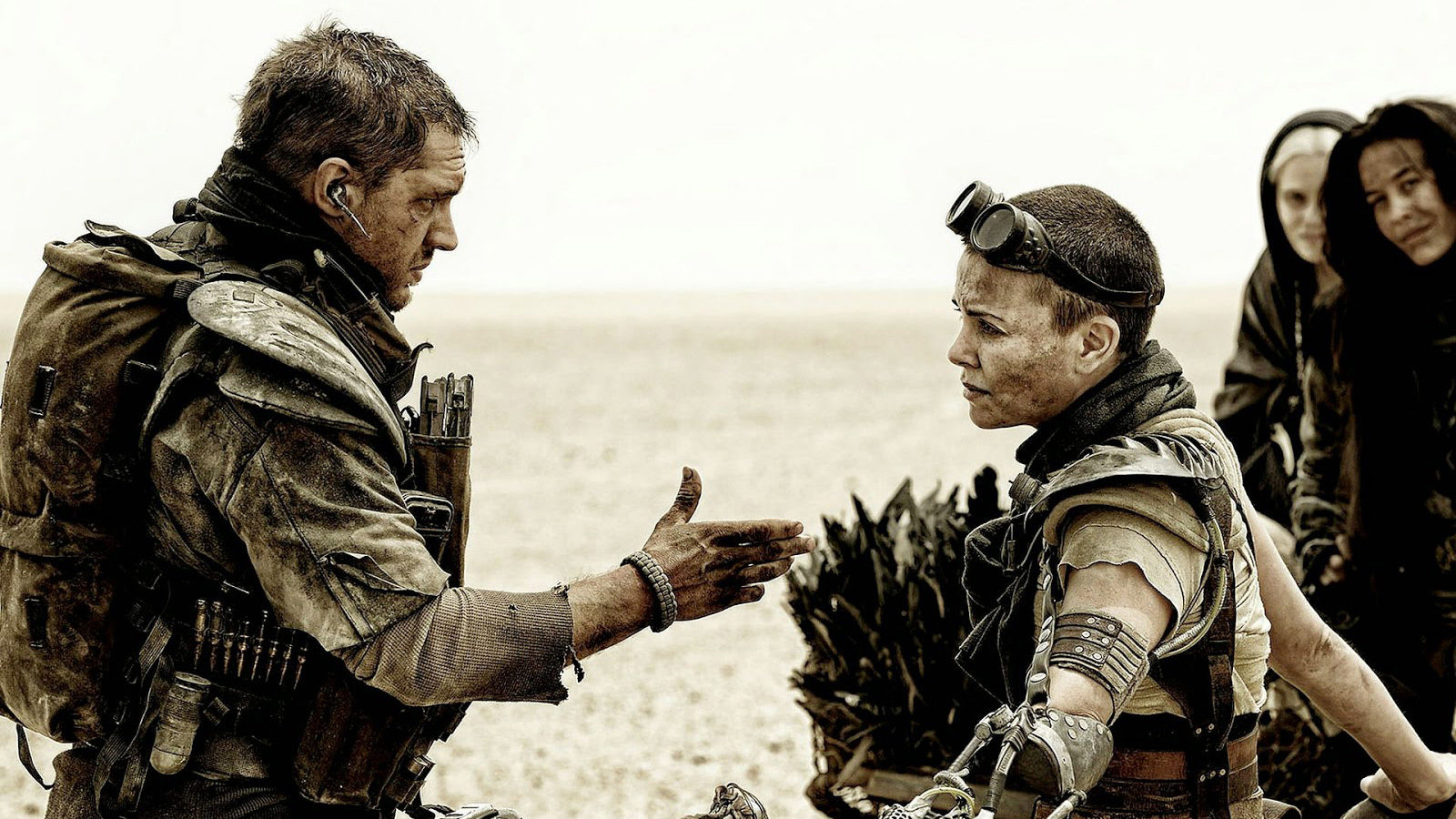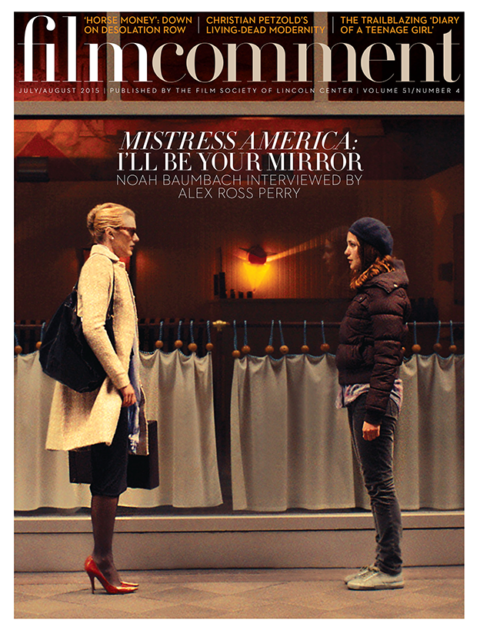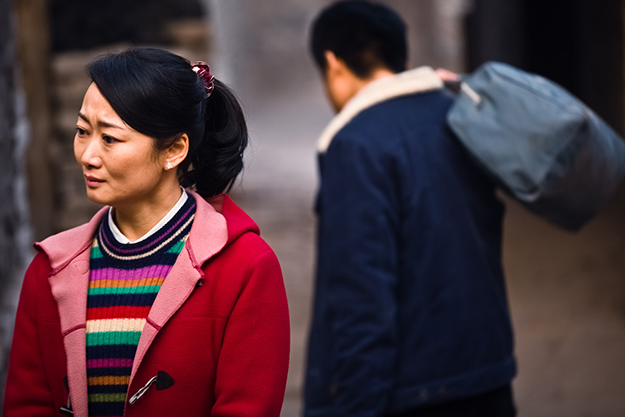
Did it mean anything that Mad Max: Fury Road, which screened out of competition on Day 2, was still being cited as one of the festival’s truly great films on Day 11 (the festival’s clôture)? And that when Pixar’s Inside Out was unveiled on Day 6, it was embraced with equal enthusiasm? Both were, as the late Cannes veteran and former FILM COMMENT editor Richard Corliss would have said, “nifty”—smart, superior Hollywood crowd-pleasers that delivered guilt-free pleasure. Was their popularity a sign of the times? Was art cinema on the ropes?

It looked that way after the first three days, as one by one the films in Competition fell by the wayside. The best initial offerings seemed not much more than quite-good-but-minor (Hirokazu Kore-eda’s Our Sister, Yorgos Lanthimos’s Jury Prize–winning The Lobster) and the worst little short of dreadful (Gus Van Sant’s embarrassing The Sea of Trees, Matteo Garrone’s Tale of Tales—imagine The Princess Bride as directed by Lars von Trier). To be sure, all but the Competition’s worst (Paolo Sorrentino’s self-indulgent, arthritic Youth) had some redeeming facet—from Tim Roth’s quietly contained performance as a home nurse in Michel Franco’s unpleasantly antiseptic Chronic (the Best Screenplay winner) to the everything-but-the-kitchen-sink turn by Emmanuelle Bercot (shared Best Actress prize) in Maïwenn’s overwrought relationship drama Mon Roi, possibly my festival guilty pleasure, if such a thing is necessary. But all in all, I could only get behind half a dozen of the 19 films in the running for the Palme d’Or—and of those, only two or three were unqualified artistic successes.

The Measure of a Man
That said, Day 2 also delivered a bombshell debut in the form of Hungarian filmmaker’s Laszlo Nemes’s harrowing, ultra-immersive Auschwitz drama, Son of Saul. With undeniably virtuoso plan séquence camerawork that owes more than a little to Béla Tarr, it follows the almost wordless comings and goings of a Sonderkommando tasked with delivering his fellow Jews to the gas chamber. Redefining the ne plus ultra for cinematic depictions of the Holocaust, it was certainly one of the most polarizing films I’ve ever seen at Cannes, or perhaps anywhere. Going on to win the runner-up honor, the Grand Prix, at awards time, here for better or worse was a film that belonged in a Competition otherwise marked by the complacent affirmation of art cinema’s usual suspects.
For many, the Competition rallied on Day 4 with Todd Haynes’s much-anticipated and rapturously received Carol, but for me it wasn’t until Day 6 that I saw what felt like the first unqualified Competition hit: The Measure of a Man. As its rather more astringent French title, La Loi du marché (“The Law of the Market”), suggests, it was Exhibit B in the self-conscious programming of “socially relevant” French films heralded by festival director Thierry Frémaux when he unveiled the lineup in the April press conference. This flag was firmly planted by Exhibit A, the opening-night film, which was—gasp—directed by a woman. Emmanuelle Bercot’s Standing Tall was a fairly well-executed account of a troubled youth’s journey through France’s judicial and social-services system and as such was hardly standard opening-gala fare, but in the end it did provide an improbably feel-good, literally paternalistic resolution. The Measure of a Man echoes the late nonfiction filmmaker Harun Farocki’s studies of our neoliberal age’s mechanisms and mindset (perhaps just a little too neatly). Bleakly determinist, it dispassionately monitors the progress of an unemployed everyman (Vincent Lindon, the deserved Best Actor winner) as he jumps through a humiliating succession of hoops, winding up in a job that puts him on the front line of the reengineering of France’s workforce. Refreshingly, the film’s director, Stéphane Brizé, wasn’t a fully paid-up member of the Cannes Club either, and the presence of his film could only be regarded as a Good Thing for the health of a Competition in danger of becoming inbred. (To be fair, the efforts by the other seven Competition newcomers were hardly up to snuff, from Valérie Donzelli’s reworking of a discarded Truffaut project, the idiosyncratic 18th-century incest romance Marguerite & Julien, to Justin Kurzel’s Macbeth, which rendered Shakespeare’s dialogue perfectly unintelligible.)

Mountains May Depart
On Day 7 the dependable Jia Zhang-ke came up just a little short with Mountains May Depart, a triptych spanning three decades about selling out in 21st-century China. The knockout opening gave new meaning to the Pet Shop Boys’ “Go West,” but after two emotionally devastating sections, it faltered with a (forgivably) shaky third act set in 2025. After this letdown, those longing for a transcendent experience were left pinning all their hopes on a Taiwanese filmmaker last heard from eight years ago. And lo, on Day 8 Hou Hsiao-hsien descended from on high to save the day with his long-gestating wuxia period drama The Assassin, which immediately became almost everybody’s favorite Competition film (mine included), even if many professed themselves as much mystified as entranced. A film like this is almost in a league of its own, but when it received the Best Director award, some admirers felt this was nothing less than a snub.
Final validation of the festival’s Social Problem theme came when the Golden Palm (the only award that really counts) was bestowed on Jacques Audiard’s characteristically workmanlike and absorbing Dheepan, which ostensibly takes on the evergreen issue of migrant integration. Led by the titular protagonist—a former insurgent seeking to wash the blood of the Sri Lankan civil war from his hands—three Tamils gain asylum in France by passing themselves off as a family. Audiard, however, isn’t interested in foregoing either his genre instincts or his fascination with rough stuff and violence, and so the trio, who speak no French, find themselves stranded in a dismal housing project ruled by drug dealers. Hired as a caretaker, Dheepan (impressively played by Jesuthasan Antonythasan) cleans up the building—and then cleans out the vermin, putting his combat skill set to good use. So what initially comes on like a less commercial and more risk-taking venture than Audiard’s last Competition entry, Rust and Bone, ends up delivering the safer if genuine pleasures of a small-scale thriller in the guise of un film social. The film pays only lip service to the asylum-seeker problem and questions of cultural assimilation, which nevertheless furnish a novel backdrop and characters for Audiard to play with.

Dheepan
There’s nothing shameful in any of this, but the ambitions of Dheepan are nonetheless pretty meager. Though it sounds churlish to say, the festival doggedly selects its favored directors for Competition over and over until finally it’s their turn for the Big One. As with past winners (Nuri Bilge Ceylan, von Trier), four-time Competition contender Audiard finally got what he wanted and perhaps felt entitled to. It’s just a matter of time for Paolo Sorrentino, Xavier Dolan, Andrei Zvyagintsev, Alejandro G. Iñárritu, and even Maïwenn, if she plays her cards right. Meanwhile, after a last-minute invitation, 2010 Golden Palm winner Apichatpong Weerasethakul wound up in the company of such prominent filmmakers as Kiyoshi Kurosawa, Brillante Mendoza, and Corneliu Porumboiu in Un Certain Regard. Once nominally intended to be the section for promising up-and-comers and new discoveries, for some years now the section has been doing double duty as a dumping ground for filmmakers on their way down, not quite ready (or too challenging) for prime-time, or in a holding pattern pending another invitation to the main event.
The real elephant in the Palais this year was the Directors’ Fortnight, which played three films by leading filmmakers that apparently weren’t up to the exacting standards met by Joachim Trier’s Louder Than Bombs or Guillaume Lecloux’s The Valley of Love. The presence of Arnaud Desplechin’s My Golden Days, Philippe Garrel’s In the Shadow of Women, and Miguel Gomes’s Arabian Nights (all six hours of it) were sufficient to ensure that the official selection was completely overshadowed and perhaps even something of a laughingstock for the connoisseurs. Desplechin declined the semi-insulting offer of a berth in the designated dumping ground in favor of an invitation from the other end of the Croisette to premiere his enchanting bildungsroman. Garrel, with only one previous film in Competition, has always had an affinity for the alternative festival that the Fortnight can be at its best, as in this edition. And Gomes? Having doubtless muttered “never again” after selecting Pedro Costa’s Colossal Youth for Competition in 2006, Frémaux et al have decisively backed away from anything even remotely smacking of the avant-garde. A red-carpet treatment for the admittedly unwieldy three-part Arabian Nights? Perish the thought. The festival now defines the Competition as a safe place for establishment filmmakers. It probably always did, aside from the occasional departure—but its conception of what passes muster has clearly narrowed.

The Valley of Love
Is it really necessary to keep including even two-time Golden Palm winners like Michael Haneke and the Dardenne Brothers in the Competition Big Top? The Cannes audience wouldn’t stand for their being excluded, some say, mindful of the imperatives of glamour and star power. But just think: if you made all the past Golden Palm winners ineligible for the Competition and recentered the festival on a Gala section for those Cannes-certified filmmakers, the Competition could become the place to see perennial also-rans side by side with newcomers. That would surely make for a less predictable, more adventurous proposition.